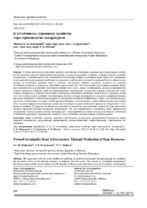К устойчивому дорожному хозяйству через производство негаресурсов

Date
2023Publisher
Another Title
Toward Sustainable Road Infrastructure Through Production of Nega-Resources
Bibliographic entry
Жуковский, Е. М. К устойчивому дорожному хозяйству через производство негаресурсов = Toward Sustainable Road Infrastructure Through Production of Nega-Resources / Е. М. Жуковский, С. Е. Кравченко, Н. В. Шехова // Наука и техника. – 2023. – № 3. – С. 256-264.
Abstract
В статье рассмотрена актуальная проблема достижения устойчивого развития через обеспечение устойчивости отдельных отраслей национальной экономики, в частности дорожного хозяйства. Раскрыто понятие «устойчивое развитие» и оценены шаги по его достижению в Республике Беларусь в настоящее время. Кроме того, предпринята попытка обосновать влияние устойчивости дорожного хозяйства как составной и связующей части субъектов экономики на устойчивое развитие стран и регионов. Рассмотрено влияние дорожного хозяйства на элементы устойчивого развития и оценены его дальнейшие перспективы. Для этого предложено рассматривать влияние дорожного строительства на различных структурных уровнях: мега-, мезо-, макро- и микроуровне, которые затрагивают все аспекты дорожного хозяйства, такие как проектирование, строительство, содержание и ремонт, производство строительных материалов и изделий. Рассмотрена возможность реализации концепции негаресурсов в дорожном хозяйстве. Под негаресурсами понимают потенциальные ресурсы, которые формируются в результате совершенствования процессов обращения с конечной продукцией за счет рационализации ее потребления, а также с исходными ресурсами за счет оптимизации отдельных стадий производственного и логистического циклов. Рынок негаресурсов может быть создан по примеру существующего рынка квот на выбросы в рамках Киотского протокола и Парижского соглашения по климату. В дорожном хозяйстве сегодня имеется множество перспективных технологий, при применении которых образуется большое количество негаресурсов. Так, учет негаресурсов в жизненном цикле транспортных сооружений, а также создание системы материального стимулирования на основе негаресурсов позволят обеспечить устойчивость дорожного строительства, а вместе с тем и устойчивое развитие страны и региона в целом.
Abstract in another language
The paper deals with the actual problem of achieving sustainable development, through ensuring the sustainability of certain sectors of the national economy, in particular the road sector. The concept of “sustainable development” has been revealed and the steps to achieve it in the Republic of Belarus today have been assessed. In addition, an attempt has been made to substantiate the impact of the sustainability of the road sector, as an integral and connecting part of economic entities on the sustainable development of countries and regions. The influence of the road sector on the elements of sustainable development is considered and its further prospects are assessed. For this, it is proposed to consider the impact of road construction at various structural levels: mega-, meso-, macro- and micro-level, which affect all aspects of the road economy, such as design, construction, maintenance and repair, production of building materials and products. The possibility of implementing the concept of nega-resources in the road sector is considered. Nega-resources are understood as such potential resources that are formed as a result of improving the processes of handling the final product by rationalizing its consumption, as well as with initial resources by optimizing individual stages of the production and logistics cycles. A market for negaresources could be created following the example of the existing market for emissions allowances under the Kyoto Protocol and the Paris Climate Agreement. The road sector today has many promising technologies, the use of which generates a larger amount of nega-resources. So taking into account nega-resources in the life cycle of transport facilities, as well as creating a system of material incentives based on nega-resources, will ensure the sustainability of road construction, and at the same time the sustainable development of the country and the region as a whole.
View/
Collections
- № 3[11]
